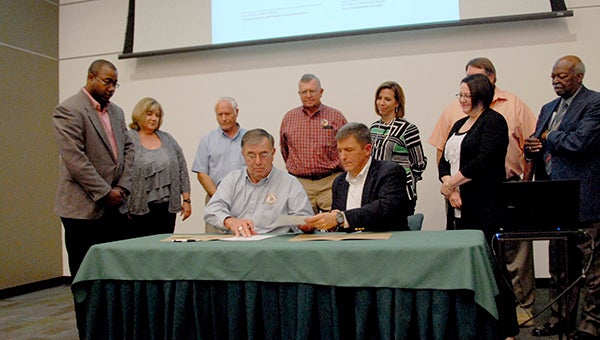The top five stories of 2014
Published 5:36 pm Tuesday, December 30, 2014

County Chairman Frank Loeffler and Bainbridge Mayor Edward Reynolds sign pledges of support for a newly formed government council that sought to bring the city and county together for formal, quarterly meetings in hopes of making the region stronger for residents and elected bodies and their communication. Unfortunately, it didn’t last for long. See No. 1 for the rest of the story.
A lot happened in 2014. Below, The Post-Searchlight counts down its top five stories of the year.
5. Solar Panel project approved
On Dec. 11, the Georgia Public Service Commission unanimously approved a number of solar power purchase agreements, two of which will be in Decatur County.
The Decatur Parkway Solar Project, LLC, an 80-megawatt solar panel project, is expected to be online by the end of 2015 or 2016.
The Decatur County Solar Project, LLC, a 20-megawatt solar panel project, expected to be online by the end of 2015.
Tradewind Energy will install the solar panels and Southern Power will operate the solar power facility.
Southern Power, a subsidiary of Southern Company, is a wholesale energy provider.
The energy generated by the solar farm would be sold to Georgia Power to meet the needs of customers throughout the area.
The capital investment for the project is estimated to be $200 million. Based on the current millage rates, property taxes for the taxable equipment would project to roughly $1.7 million annually. Of that total, the Decatur County Board of Education would realize an estimated $970,000 and Decatur County would receive about $700,000.
“Normally, when you get projects that generate these kind of tax numbers, you have to turn around and spend some of that to facilitate the project,” Rick McCaskill, Executive Director of the Development Authority of Bainbridge & Decatur County said. “What’s great about this project is that we don’t have to do that. This is a major, major project that we should all be excited about.”
4. New Jones-Wheat Elementary School opens its doors
The new Jones-Wheat Elementary School, built at its original location on Shotwell Street, opened its doors for learning on Oct. 9 after students, faculty and workers had spent more than a year at an interim location on Dothan Road. The project was funded by EPLOST.
The new school features some of the best and most cutting edge learning technology available.
Forty-two of the classrooms are equipped with SMART Board technology, allowing students to write and digitally interact with material on the white boards. Teachers can use their smartphones or iPads to control what’s on the board or have a student answer a question from their desk.
In addition, safety was one of the main focuses when designing the new school. Almost every window in the building is laminated with two layers of glass and a plastic membrane between them for blast-proof safety. The front doors can be magnetically locked to keep unfriendly visitors from coming inside. The gymnasium has a filter system that cleans toxic air and produces clean, breathable oxygen.
Principal Larry Clark is proud of the new school and the success he hopes students will find inside its walls.
“It’s really neat to see all of our dreams become a reality,” Clark said. “We have spent a lot of hours laying things out, planning and making changes to fit the needs of our kids.”
A formal dedication was held Sept. 28 to recognize those involved in making the new Jones-Wheat a reality.
3. Brinson native Maggie Bridges crowned Miss Georgia
Maggie Bridges, a Georgia Tech student and Brinson native who was raised in Decatur County, was crowned Miss Georgia at the annual Miss Georgia Pageant in Columbus on June 22.
80 young women from across the state gathered to compete for the Miss Georgia and Miss Georgia’s Outstanding Teen titles. Contestants competed in preliminary competitions including Lifestyle and Fitness, Talent and Evening Wear leading up to the final competition.
The final two contestants left standing were Bridges and her longtime friend and college roommate Taylor Voyles. The two embraced when Bridges was named Miss Georgia.
Bridges went on to compete in the Miss America pageant in September in Atlantic City, New Jersey. Though she didn’t make it to the final round, proud Decatur County residents showered Bridges with support. She was honored with her own special event at the Kirbo Center before leaving for Miss America, appeared as Grand Marshal of the Bainbridge Christmas Parade and a sign was erected at the entrance to Brinson proclaiming the home to the 2014 Miss America.
2. Local deputies delivered seven-count indictment
Two Decatur County Sheriff’s Office deputies, a former Decatur County deputy and a Grady County deputy received a seven-count federal indictment for civil rights violations and the obstruction of justice.
The indictment charged Wiley Griffin, IV, son of Decatur County Sheriff Wiley Griffin III, DCSO captain Elizabeth Croley with the violation of the rights of Parrish at the annual motorcycle event Bainbridge BikeFest in 2012.
Croley, DCSO deputy Christopher Kines and former DCSO deputy Robert Wade Umbach were also charge with obstructive conduct during the investigation of the civil rights violation.
According to a Decatur County Sheriff’s Office incident report, a fight at BikeFest event on Sept. 14-15, 2012, resulted in Ronnie Aaron Parrish, a BikeFest attendant and Bainbridge resident, allegedly being beaten by deputies. The indictment also accuses the deputies of creating false reports to cover the incident and misleading FBI investigators.
It was later announced that Decatur County had plans to cover legal expenses for Kines, Croley and Umbach, with the Griffin family paying for Griffin IV’s legal counsel.
The four indicted individuals made their first court appearance on Aug. 5 and were arraigned at the U.S. Courthouse in Albany. All four were arraigned and pled not guilty to the charges included in the indictments.
On Aug. 27, the U.S. government filed for a protective order to be placed to guard government witnesses from harassment and to ensure the integrity of future proceedings. The defendants responded with an opposing motion, arguing there was no good cause for the government’s motion to warrant a passing.
After the defendants filed a motion to postpone the trial of the four individuals from January to May or June due to the complexity of the case, the government compromised and proposed the trial to be in March.
Approval of a trial date is pending a decision from Judge Sands.
1. Decatur County, Bainbridge dispute leads to legal action
After coming together to discuss the distribution of L.O.S.T. in 2012, the City of Bainbridge asked Decatur County if they could also renegotiate The Service Delivery Strategy between the two entities, which is effective until October 2017. What happened next sparked a disagreement that ultimately led to Bainbridge suing Decatur County on Nov. 14.
Bainbridge’s argument over Service Delivery was that Bainbridge residents were paying taxes for county services they weren’t receiving. In an effort to gather evidence to prove their allegations, Bainbridge sent the county an open records request on Nov. 26, 2013, for various invoices and operating budgets.
“It’s getting into the closets, the men’s rooms and the lady’s rooms,” Decatur Co. Breedlove said in Nov. 2013 as a reaction to the information being requested.
Decatur County complied. Eventually, the two entities agreed to a quarterly meeting called the Council of Governments in an effort to mend relations starting in April. The county broke off the meetings when the Bainbridge City Council presented information at their meeting on Aug. 5 about the “double taxation” Bainbridge residents were receiving.
After having attorneys from Smith Welch Webb & White of McDonough, Georgia send Decatur County their assessment of the city’s open record request, which proved Bainbridge was being “double taxed,” Decatur County voted to form a committee to analyze the law firm’s findings. No long after, on Nov. 14, Bainbridge filed a lawsuit against Decatur County over the service delivery agreement and double taxation.
Decatur County filed an official response to the lawsuit on Friday, Dec. 19, that stated, “(Bainbridge’s) Petition fails to state a claim on which relief may be granted,” and also claims that “(Bainbridge’s) petition is not ripe for adjudication,” the “claims are barred by the doctrines of laches and unclean hands” and Bainbridge “had an affirmative responsibility to resolve any service delivery dispute that existed at the time it agreed to the L.O.S.T. distribution set forth (on Oct. 15, 2013),” according to the counter-claim.







